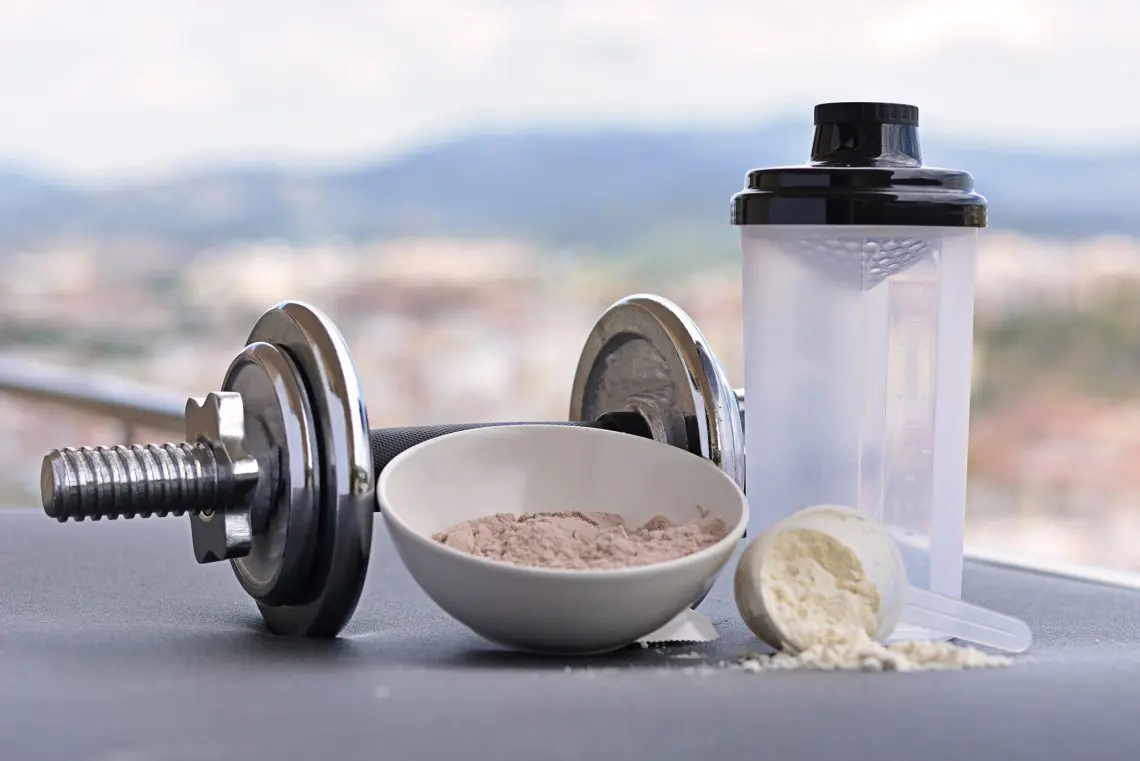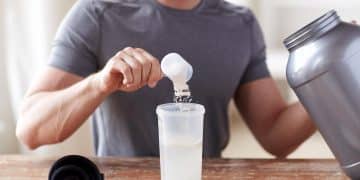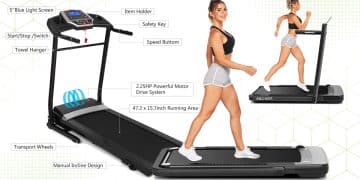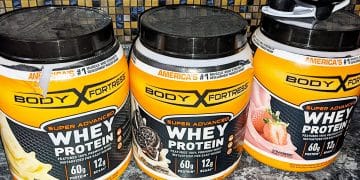Written byMatthew Magnante, ACE
Last Updated onSeptember 28th, 2021
Today we’re reviewing ten low calorie protein powders that’ll fuel your muscle gains and help you drop those few extra pounds. That is, of course, if the rest of your diet is conducive to burning fat because “low-calorie” doesn’t automatically equate to fat loss.
There are several components of an effective fitness regime including maintaining the proper energy balance, exercising, reducing stress, and most importantly, being consistent. And proper supplementation can certainly help too!
Low Calorie Protein Powders:
- Transparent Labs Protein Powder – Buy here Editor’s Choice
- Optimum Nutrition Gold Standard 100% Whey – Buy here
- Isopure Zero-Carb Protein Powder – Buy here
- Dymatize ISO100 Hydrolyzed Protein Powder – Buy here
- Performance Lab Sport Protein Powder – Buy here
- Anthony’s Premium Pea Protein – Buy here
- Orgain Organic Plant-Based Protein Powder – Buy here
- FitMiss Delight Women’s Protein Shake – Buy here
- Quest Nutrition Protein Powder – Buy here
- Naked Nutrition Whey 100% Grass-Fed Protein – Buy here
So for this review, we chose some of the best products on the market not just because they say ‘low-calorie,’ but because we also think they’re quality options.
Editor’s Choice – Transparent Labs Protein Powder
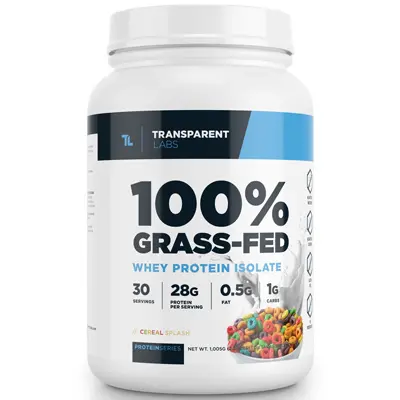
Transparent Labs is one of the hottest companies out right now and their products definitely live up to the hype. They have a grass-fed whey and isolate, and a vegan option too, although the isolate has slightly fewer calories than the other two at 120 calories per serving.
A serving also gives you a very high dose of protein at 28g at an 88% protein-to-weight ratio (per 32 grams), and it’s a simple ingredient formula containing only grass-fed whey isolate, natural flavor, sodium chloride, and Stevia.
Check out our review of Transparent Labs ProteinSeries 100% Whey Protein Isolate Review
Level Up Your Fitness: Join our 💪 strong community in Fitness Volt Newsletter. Get daily inspiration, expert-backed workouts, nutrition tips, the latest in strength sports, and the support you need to reach your goals. Subscribe for free!
Expect expert-backed workouts, nutrition advice, the latest in strength sports, and a whole lot of motivation heading your way.
Product highlights
- 120 calories
- 28g protein
- 0 fat, 2g carbs, and 0 sugar
- Gluten-free
Pros
- Higher protein per serving than a lot of options
- Naturally flavored and sweetened
- No artificial coloring
- Non-GMO
Cons
- A little pricier but the quality is reflective of this
Ingredients
- Grass-fed whey protein
- Natural flavor, sodium chloride, stevia
Who makes it
Transparent Labs gets the name because they aren’t afraid to disclose everything included on the label. They also make very clean products free from the stuff that you don’t necessarily want or need.
Optimum Gold Standard 100% Whey
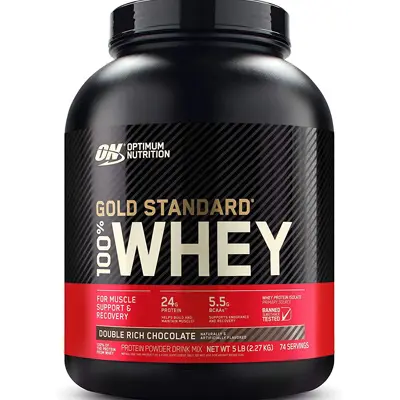
Optimum Nutrition Gold Standard Whey has been the ‘standard’ by which other protein powders are measured for many years. While there are other options just as good these days, it’s still a very popular and quality option.
It contains only 120 calories, which is very low compared to a lot of options, and you get a generous 24g of protein to support recovery and growth. Gold Standard Whey is an extremely versatile protein powder that has tons of tasty flavors, not to mention, it mixes extremely well.
The protein sources are whey isolate and concentrate which are fast-digesting and thus, are superior for initial protein synthesis (building of proteins). Isolate goes through an additional filtration process that rids a lot of the carbs, fats, and lactose, which makes it easier on the stomach. Whey concentrate is a less-filtered whey but still provides a quality protein source.
The product is gluten-free.
Related: The Absolute Best Tasting Protein Powders Of 2020 Reviewed!
Product highlights
- 120 calories
- 24g protein
- 1.5g fat
- 3g carbs
- 1g sugar
- Gluten-free
Pros
- Best-seller with a long track record
- Low-fat
- Low-sugar
- Instantized powder improves mixability
- Informed-choice (Trusted by Sport)
Cons
- Contains artificial flavoring and sweetener
- Contains soy
Ingredients
- Whey protein isolate, concentrate, and peptides
- Cocoa powder, lecithin, natural and artificial flavor, acesulfame potassium, lactase
Who makes it
Having been around for over 30 years and supplying 90+ countries with workout nutrition, Optimum Nutrition is one of the most trusted brands there is.
Isopure Zero-Carb Protein Powder (Unflavored)
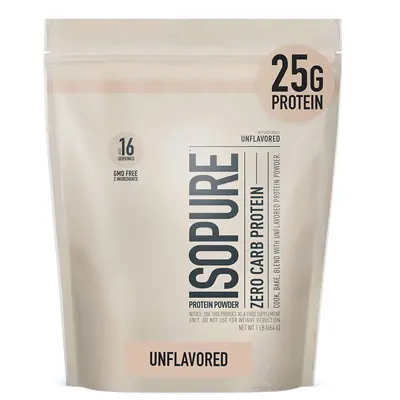
Isopure is another popular choice among protein powder enthusiasts. They have a low and zero-carb option but the latter has 10 calories less, at 100 calories per serving.
It’s an isolate that is more filtered, leaving you with over 90% protein (good for gains), and is loaded with amino acids. There is absolutely no fat, carbs, or sugar, and there’s no added colors, flavors, or sweeteners either.
We recommend the unflavored version as most users seem to really love it. But with that being said, you’ll want to mix it with something to have the best flavor experience.
Product highlights
- 100 calories
- 25g protein
- 0g fat, carbs, and sugar
- Gluten and lactose-free
Pros
- Contains only two ingredients
- No added colors, flavors, or sweeteners
- Loaded with vitamins and minerals
- 0 fat, carbs, and sugar
- GMO-free
- Keto-friendly
Cons
- Some don’t like taste (made to be mixed to improve taste)
- Few complaints power dissolving
- Contains soy
Ingredients
- Whey protein isolate
- Soy lecithin
Who makes it
Isopure was started in 1984 by two guys, named Hal and Ernie with a cement mixer. In 1998, they introduced Isopure, one of the highest quality protein powders on the market today.
Dymatize ISO100 Hydrolyzed Protein Powder
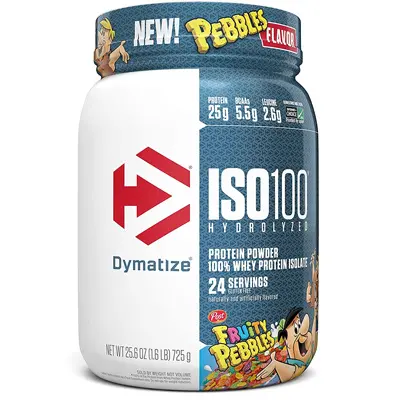
ISO100 belongs a spot on our list not just because it’s a low-calorie (100 calories per serving) protein powder but because it’s a hydrolyzed whey isolate that improves absorption, allowing for a speedier muscle tissue repair process. Will it make a significant difference? Well, that’s debatable. But when it comes to muscle-building supplements, any advantage is a good advantage. ISO 100 is also perfect for anyone who’s sensitive to lactose, not to mention, it’ll mix perfectly without clumping.
There’s a nice 25g of protein, 0 fat, carbs, and very low-sugar as well, similar to the Isopure.
Many users all really like the flavor but you’ll have to decide which you like best if you opt for this low-calorie protein powder.
Product highlights
- 110 calories
- 25g protein
- 0 fat, carbs, and <1g sugar
- Gluten-free
Pros
- Hydrolyzed whey speeds up absorption
- Isolate is easier on the stomach for many
Cons
- Contains artificial flavoring and coloring
- Contains the artificial sweetener sucralose
- Some people don’t like Stevia
- Contains soy
Ingredients
- Hydrolyzed whey protein isolate, whey protein isolate
- Natural and artificial flavors, salt, soy lecithin, sucralose, steviol glycosides (stevia)
Who makes it
Dymatize produces some of the highest quality products, “led by Dr. Rob Wildman, who has over 50 years of experience developing revolutionary products based on Real Science.”
They test their product with elite athletes to ensure they’re top-notch.
Performance Lab SPORT Protein Powder
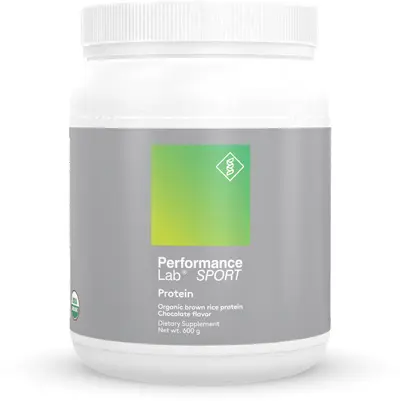
Apparently, Performance Lab Sport Protein is the first brown rice protein powder (Oryzatein Ultra 80) that has been shown to build muscle as effectively as whey protein (who are we to argue that). It’s plant-based which could mean better digestion and we really like the look of this product.
There are only 100 calories per serving in addition to organic coconut water, and Himalayan pink salt that are good for hydration. The powder also contains a probiotic (bacillus coagulans) which is known to support a healthy gut and immune system and improve nutrient (protein) absorption.
Being that it is made from brown rice, you also get 40% manganese that is an essential trace element and cofactor for many enzymes.
There’s no soy, no gluten, and it’s a vegan-friendly product.
The powder is naturally-flavored with cocoa, vanilla, and Ceylon cinnamon and naturally-sweetened with organic yacon root, organic Monk Fruit extract, and Stevia leaf.
The product contains tree nuts.
Product highlights
- 100 calories
- 20g plant-based protein
- 1.2g fat
- 2g carbs and 1g sugar
- All-organic ingredients
Pros
- Natural, organic ingredients
- Naturally flavored and sweetened
Cons
- A little pricier but ingredients are top-notch
Ingredients
- Oryzatine organic brown rice protein concentrate
- Organic cocoa, organic guar, organic yacon root powder, organic coconut powder, probiotic (bacillus coagulans), natural flavors, organic ceylon cinnamon, organic vanilla bean, Himalayan pink salt, Monk fruit extract, organic stevia leaf extract.
Who makes it
Performance Lab creates clean and innovative products and that’s very apparent with their protein powder offering.
Anthony’s Premium Pea Protein
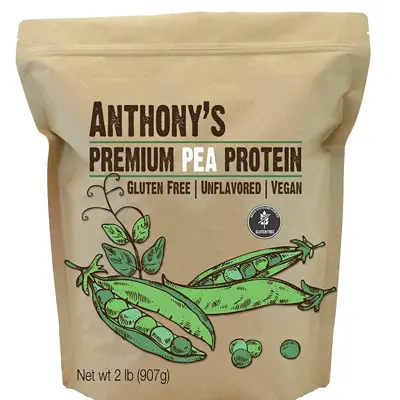
Another great plant-based option, Anthony’s pea protein powder has the lowest calories (35 calories per serving) out of any of our picks. Of course, it also has the lowest amount of protein at 8 grams per serving. But the reason we included it is that it’s a convenient and easy way to get extra protein in your diet because it’s best used in powdered mixes, baked goods, desserts, and more.
It also only has one ingredient… vegetable pea protein isolate. That’s it! This powder is made from removing the starch and fiber of yellow peas, then grinding them into a fine powder.
As for other nutrients, Anthony’s pea protein has 10% iron per serving which is an essential mineral that supports health
Product highlights
- 35 calories
- 8g protein
- 0 fat, less than 1g carbs, 0 sugar
- Natural plant-based pea protein
- Gluten-free
- Non-GMO
- Unflavored
- Unsweetened
- Vegan
Pros
- Only contains pea protein
- Contains 0 fat, low-carb, and 0 sugar
- Batch-tested and verified
- Very versatile
- No soy
Cons
- Few complaints about taste
- Few concerns about compounds in pea protein
Ingredients
- Vegetable pea protein isolate
Who makes it
Anthony’s Goods makes certified organic, non-GMO, and certified gluten-free flours, meals, and food.
Orgain Organic Plant-Based Protein Powder
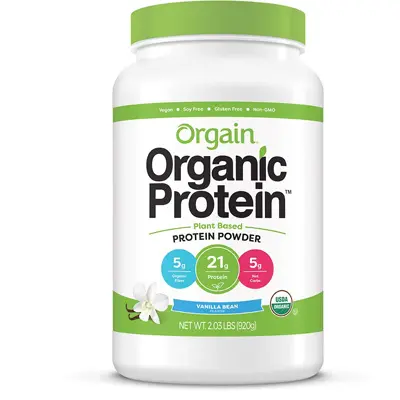
Orgain has the highest calories per serving than the others on our list, but 150 calories is not a lot if you’re not adding a ton of your own calories. Some low-calorie almond milk with maybe a frozen banana and some berries are really all you need and you’re still going to keep the calories low.
It’s a plant-based option that consists of all-organic ingredients with pea, brown rice, and chia seed protein. So you’ll get a nice variety of that’ll supply you a complete source of protein. 21g protein is plenty and 5g of fiber is great for digestive support. Each dose also provides 35% iron.
Orgain protein is one of the best plant-based protein powder options that you can get your hands on.
Product highlights
- 150 calories
- 4g fat, 15g carbs (5g net carbs), 0 sugar
- 5g fiber
- 21g protein
- Three plant-based protein sources
- Vegan
- Soy-free
Pros
- Best-seller with good track record
- Natural, organic ingredients
- Non-GMO
Cons
- Gums could cause some digestive discomfort for some users
- Acquired taste
Ingredients
- Organic pea, brown rice, and chia protein
- Organic – acacia gum, high oleic sunflower oil, rice dextrin, rice bran extract, rosemary extract, natural flavors, erythritol, natural flavor, sea salt, acacia gum, guar gum, stevia, xantham gum
Who makes it
The company was founded by a doctor and cancer survivor who wanted healthier nutrition options, so he quit his medical practice and started Orgain.
FitMiss Delight Women’s Protein Shake
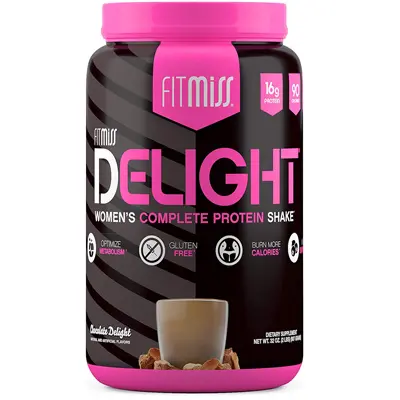
FitMiss Delight was designed specifically with the woman’s goals in mind, hence the low, 90 calories per serving. It features whey protein concentrate and an ingredient called SolaThin potato protein extract, which is a 90% protein isolate that “delivers a 40% concentration of protease inhibitors–including PI-2, a protease inhibitor that signals both the brain and the GI tract that the stomach is full.”
As a result, this could really help to lose those extra pounds, and 16g of protein is very respectable for helping to maintain and build muscle mass in combination with an effective exercise regime.
This protein powder also contains a greens and superfoods blend that supports good health, and the digestive enzymes protease and lactase that helps to break down and digest protein and lactose respectively.
You also get a nice dose of B12 at 50mcg (2083%), which is essential for cell health, neurological function, DNA synthesis, and more.
FitMiss protein powder seems to be a great option for weight management supplementation.
Product highlights
- 90 calories
- 16g protein
- 1.5g fat, 3g carbs, 1g sugar
- Gluten-free
- Banned substance tested
Pros
- Designed for women’s goals
- Low-fat, low-carb, and 0 sugar
- SolaThin potato protein may offer additional satiety
Cons
- Could cause stomach discomfort in some users
- Naturally and artificially flavored and sweetened
- Contains soy
Ingredients
- Whey protein concentrate, SolaThin potato protein extract
- Greens and superfoods, digestive enzymes, cocoa powder, natural and artificial flavors, inulin, cellulose gum, salt, sucralose, acesulfame potassium, soy lecithin
Who makes it
The FitMiss line was designed specifically for women who want to achieve their fitness goals.
Quest Nutrition Protein Powder
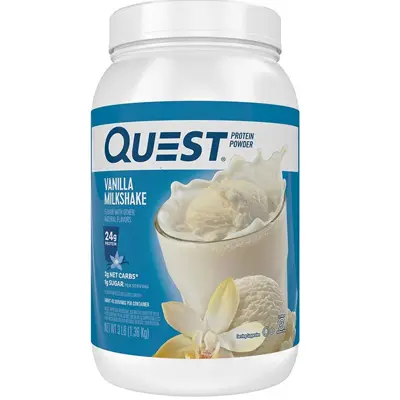
Quest is a well-known brand and while their bars are very popular, they have some good powders too. With only 100 calories per serving and a respectable 24g of protein, Quest protein offers the perfect muscle-building and fat loss combo. There’s no fat, no carbs, and only <1g (1%) carbohydrates too.
Whey isolate and micellar casein (slow-digesting) protein are a good combination to support your goals.
You can mix it with anything or have a few shakes throughout the day and you’ll still be well under your daily caloric intake. But even if you wanted to add some extras (e.g. fruits and nut butters), it’d still be low-calorie. Quest powder is also a great multi-use powder as you can cook and bake with it and they tend to have good flavors for the most part.
Product highlights
- 110 calories
- 24g protein
- .5g fat, 2g net carbs, and <1g sugar
- Soy-free
- Gluten-free
Pros
- Contains a fast and slow-digesting protein (best of both worlds)
- Good for culinary uses
Cons
- Few ingredients could cause stomach discomfort
- Contains sucralose
- Some people don’t like Stevia
Ingredients
- Protein Blend (Whey Protein Isolate, Micellar Casein)
- Natural Flavors. Contains Less than 2% of: Sea Salt, Sunflower Lecithin, Cellulose Gum, Carrageenan, Silicon Dioxide, Sucralose, Steviol Glycosides (Stevia).
Who makes it
Quest Nutrition’s is about making tasty, low-carb, low-sugar products that are healthy and nutritious.
Level Up Your Fitness: Join our 💪 strong community in Fitness Volt Newsletter. Get daily inspiration, expert-backed workouts, nutrition tips, the latest in strength sports, and the support you need to reach your goals. Subscribe for free!
Expect expert-backed workouts, nutrition advice, the latest in strength sports, and a whole lot of motivation heading your way.
Naked Nutrition Whey 100% Grass-Fed Protein
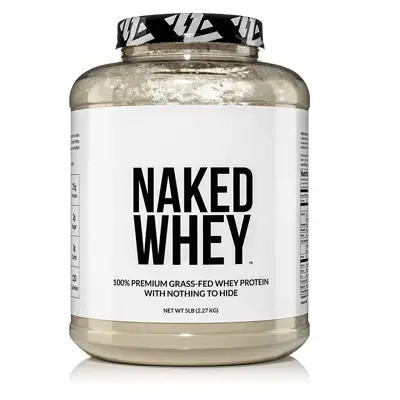
As the name suggests, Naked whey grass-fed protein is as simple as it gets. containing only whey protein concentrate from grass-fed cows. A serving contains 120 calories, 25 g of protein to support muscle growth, and is cold-pressed for product purity.
The powder is best mixed with a shaker bottle or blender and is great when combined with other ingredients.
Product highlights
- 120 calories
- 25g 100% grass-fed protein isolate
- Cold-pressed
- 2g fat, 3g carbs, 2g sugar
- Unflavored
- Gluten-free
- Soy-free
Pros
- Simple, one-ingredient product
- Low-carb, low-sugar
- No artificial sweeteners, flavors, or colors
- Non-GMO
- Informed-Choice (Trusted by Sport)
Cons
- Few complaints about taste (to be expected)
Ingredients
- Whey protein concentrate
Who makes it
Naked Whey products are loaded with essential amino acids and contain no artificial sweeteners or colors, or additives. They make pure products that are top quality.
How We Ranked
We considered a few different factors when making our low-calorie protein powder picks of which we provided below.
Effectiveness/ What Does It Contain?
Any of the protein powders that we selected are more than good enough for helping you to meet your daily requirements regardless of your goals. With that being said, no protein powder is effective without a solid nutrition and training regime.
But it’s good to understand the importance of protein in your diet and there are many benefits to consuming an adequate amount of protein on a daily basis. Protein is not only essential for building muscle and strength, but it’s necessary for many chemical reactions in the body, hormones, and more.
Protein also contains amino acids that are the building blocks of protein. Milk-based protein powder contains all nine essential amino acids while most plant proteins are missing one or more, which makes them an incomplete protein (1).
But you can absolutely get all nine essential amino acids from a plant-based protein by combining plant proteins to get all of your amino acids. Most people would never have the problem of not getting enough amino acids with a proper, nutritious diet that contains variety (2).
Some of the plant protein powders that we chose contain one or more protein sources and are plenty nutritious to meet your needs. But they shouldn’t be your only source of nutrition.
The other ingredients should fit your goals and can be more flexible, of course. As long as you get good quality protein from a protein supplement then you should expect to get just that. So, if there’s anything added like digestive enzymes and/or superfoods, then you might opt for an option containing these health-promoting ingredients.
Overall value
We don’t want you to overpay for anything, much less a protein supplement. There are literally so many great options out there although we think the ones you’ll find above are among the best values that you can find right now.
But value is actually subjective because it depends on what you’re looking for in a product.
We consider a good value to be a combination of…
- Quality of ingredients
- Amount of servings for the price
- Company reputation/history
- User feedback
For the most part, these are the most important determining factors in ensuring you choose the best possible product for you.
Who Should Buy Low-Calorie Protein Powders
If your goal is to maintain and build muscle while losing weight, then you should include a low-calorie protein powder in your daily nutritional regime. But if you also want an easy and convenient healthy nutritional option, it’s perfect for that too. You don’t have to weight train or be super active to take advantage of the benefits of a quality protein powder, of which you probably know by now.
But it’s also important to note that a low-calorie protein powder can also easily be turned into a meal replacement or healthy weight gainer shake by adding fruits, nut butter/s, your choice of liquid, etc. Even people who are trying to lose weight can add extras as long as they’re in a caloric deficit at the end of the day.
But if you prefer a very low-calorie protein shake, any of the options on our list, when combined with water or a low-calorie liquid such as unsweetened almond milk, for example, will give you just that!
Here are The Top 20 Simple Weight Loss Tips and also try our TDEE Calculator
How Should I Pick A Good Low-Calorie Protein Powder?
- Ingredients – The ingredients should first and foremost be of acceptable quality and based on your preference. There are many different forms of protein and we hope that we covered the differences adequately so that you can make the best possible choice when deciding on a protein powder. Also, consider natural vs. artificial ingredients, and that fact that some products contain soy and nuts. This all comes down to preference.
- Brand reputation – Many brands have been around for a while and have built a solid reputation. They disclose their ingredients, make known their manufacturing practices with certifications, and have a loyal fanbase. But this can also be said for newer companies with the same credentials and number of satisfied users.
- Value – A good value offers a respectable amount of the key ingredient/s with an appropriate number of servings for a price that reflects what the product offers.
- Key Ingredients content – Choose a product that provides a respectable amount of protein per serving, and for the number of calories that the product contains. All of the products on this list have a useful dose of protein for the number of calories that you’re consuming. Also, consider the fat, carbs, and sugar sources before deciding on a product as there are so many different options.
- Convenience factor – Many protein powders are rather convenient as they only require you to add scoops and mix or blend. Some options have better mixability while others need more than a good shake. It’s best to opt for a protein powder that you both enjoy and which offers you what you desire from a product.
Benefits
In this section, we’ve discussed some of the benefits of consuming sufficient protein.
Weight management
Protein is a key macronutrient in weight management because of its ability to promote satiety, preserve and build muscle mass, and promote good overall health by maintaining essential bodily functions.
Protein burns more calories during digestion compared to carbs and fats. When digestion burns calories, this process is referred to as thermogenesis (3).
In one study, researchers discovered that eating a high-protein, low-fat diet caused a 100% increase in postprandial thermogenesis when compared to a high-carb, low-fat diet. This is certainly helpful evidence when understanding the impact that protein has on calories burned following a meal (4).
In a scientific review of studies, we learned that “higher-protein diets that contain between 1.2 and 1.6 g protein · kg-1 · d-1 and potentially include meal-specific protein quantities of at least ∼25-30 g protein/meal provide improvements in appetite, body weight management, cardiometabolic risk factors, or all of these health outcomes“ (5).
In other words, don’t skimp on quality protein!
And to add to the benefits of consuming sufficient amounts of this macronutrient, research has found that protein reduces levels of the ‘hunger hormone’ ghrelin while increasing the hormones that promote satiety (6, 7).
In a study of 27 overweight/obese men, researchers determined that a high protein, energy-restricted diet was superior for appetite control compared to a normal protein, energy-restricted diet.
However, increased meal frequency (e.g. eating six meals instead of three) offered no advantage. And actually, those who ate three meals per day with higher protein intake experienced “greater evening and late-night fullness” compared to the group who ate six meals (8).
Protein also contains fewer calories than fat, leading to more immediate fat loss when fat is replaced with protein. Although you still want to maintain a balanced diet of which healthy fat is an essential component.
Research has also shown that eating protein is good for keeping the weight off too (9).
Building muscle and strength
Protein is the macronutrient responsible for muscle hypertrophy. Because we’re breaking down muscle tissue during resistance training and exercise, that means we need more than the sedentary individual. How much?… well that depends on so many factors unique to each individual. Although there are some general recommendations which we provided later in this article.
But as far as protein timing, before and after exercise is recommended to maximize protein synthesis. Although, taking a whey protein immediately following resistance training will increase protein synthesis faster than consuming a slower-digesting protein such as most protein foods or casein protein powder (10).
The slower-digesting protein, on the other hand, is more ideal for sustaining protein synthesis over a prolonged period. (11)
Check out these Awesome Whey Protein Powders Reviewed for 2023
Protein is also important for maintaining muscle tissue during the weight loss process. Therefore, you don’t want to make the mistake of neglecting your protein intake by just focusing on your caloric intake (12, 13).
Muscle and bone loss
Sarcopenia, which is a loss of muscle tissue due to the aging process, can be very debilitating and inconvenient, to say the least. Insufficient protein intake is a risk factor for Sarcopenia (14).
Research has suggested that older adults may not get enough protein and that consuming more than 0.8 g x kg(-1) x d(-1) could help to maintain a healthy amount of bone and muscle mass (15).
Injuries
Protein is not only important for recovery after exercise, it’s crucial for recovering from injuries as well due to its tissue and health-promoting properties. In fact, according to research, the body can lose 100g protein per day due to the body being in a catabolic state (16, 17).
Heart health
High blood pressure is an alarmingly prominent issue that millions suffer with, and it’s really not surprising with the poor nutritional habits, lack of activity, and high stress levels that are more common today than ever before.
Protein can have positive effects on blood sugar, although more research is needed to provide more conclusive information on this. In addition, protein intake has shown to lower bad (LDL) cholesterol and triglycerides (18, 19).
Related: Instant Knockout Review – An Effective Fat Burner or Nah?
Side Effects
A good quality protein powder is safe for almost anyone to consume. However, it’s not uncommon for people to experience gastrointestinal discomfort whether that’s due to having a dairy intolerance, consuming too much protein powder at first (even the plant-based powders), or being sensitive to other ingredients including the artificial sweeteners, gums, etc.
Know what you’re buying and don’t be afraid to research ingredients to learn about them. Also, keep in mind that the FDA does not have to approve nutritional supplements so choose quality products. We can only provide you with as much information as we can and then the rest is up to you.
Recommended Protein Intake
This varies between individuals based on your goals and activity levels. Someone who doesn’t exercise much won’t need nearly the amount of protein that someone who is very active and who does a lot of weight training will.
Maybe you don’t weight train at all and because you don’t eat much throughout the day, a protein powder could help you to eat enough protein to maintain your health and keep you feeling full. You will need the bare minimum amount of protein to achieve this.
Or maybe you want to consume fewer calories throughout the day to lose some weight but you want to preserve your muscle mass. You’ll need more protein because weight loss will cause some muscle loss.
The Recommended Dietary Allowance (RDA) for protein is 0.8 grams of protein per kilogram of body weight. This is the absolute minimum amount recommended to maintain health.
But this is not appropriate for the active individual or those who do any form of resistance training.
For active people, it’s generally recommended to have an intake of 0.7–1 grams per pound (1.6–2.2 grams per kg) of body weight every day to support muscle gains (20).
Of course, you’ll need to experiment a little with your protein intake to determine an optimal intake for you.
FAQ
Do low-calorie protein powders help you to lose weight faster?
Not necessarily. Your overall diet/caloric intake, activity levels, and other lifestyle habits will determine the rate at which you lose weight.
How many calories does a low-calorie protein powder have per serving?
We might consider a low-calorie protein powder to have fewer than 200 calories per serving. But this depends on what each person considers to be low-calorie.
If I blend other foods with my protein shake, will I gain weight?
Your total daily and weekly caloric intake will determine whether you gain weight or lose weight, not a single shake, meal, or snack.
Recap
There’s something for everyone in our list of ten low-calorie protein powders. If your goal is weight loss then any of the options in this review will serve you well in your endeavors. Again, to experience the maximum benefits of your efforts, many other factors need to be on point including your diet, training, and lifestyle in general.
Protein powder can only provide a boost but we believe it’s a worthwhile addition to your daily health regime.
Have questions about the article? Leave them below and we’ll be happy to answer them. We also welcome comments too! Also, check out our article on the Best Lactose-Free Protein Powders For 2020.
If you have any questions about this article, please feel free to contact Matthew Magnante by leaving a comment below.
 You can also follow us on Twitter, Facebook, Instagram, and
YouTube for even more content.
You can also follow us on Twitter, Facebook, Instagram, and
YouTube for even more content.

